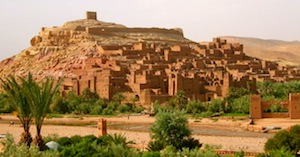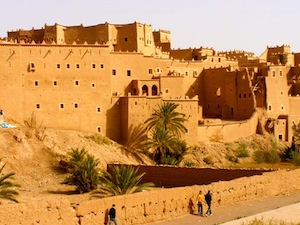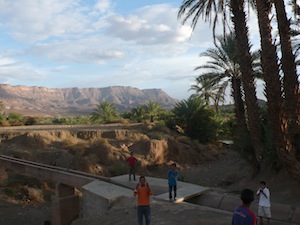Ouarzazate has always been a cultural meeting place and melting pot for the various peoples of the North and South for trade and cultural exchanges. Merchants settled in the city of Ouarzazate and excavations have found gold and precious metals. The town thrived on the Saharan camel trade routes coming up form Africa via Timbuktu and the ancient city of Sijilmasa. Slaves and gold were traded for salt and the ethnic mix of Ouarzazate reflects the many different tribes that have passed through with descendants from Mali and further a field. Berbers, Africans and Jewish Berber tribes lived side by side for centuries in Morocco.
Ouarzazate nicknamed The door of the desert ( the name means”without noise” or “without confusion”), is a city and capital of Ouarzazate Province in the Souss-Massa-Drâa of southern-central Morocco. Ouarzazate is located at an elevation of 1,160 metres (3,810 ft) in the middle of a bare plateau south of the High Atlas Mountains. To the south of the town is the desert. Trips to Mezouga with camel treks and campsites where one can spend the night under the stars are especially popular as are Sahara Desert 4X4 expeditions.
The town of some 60,000 retains a sense of adventure and excitement that one remembers from driving across southern Morocco in the early 1980’s it is still not too commercialized when compared to Marrakech. It has grown dramatically over the years and now has its own airport and is a major tourist center. Some 80,000 tourists visited Ouarzazate in the first three months of 2012 according to the local tourism authority. The town several five star hotels as well as 5 Star Moroccan Riads along with less expensive accommodations.
The town is not totally focused on tourism, which gives it a certain attractive independence, for Ouazarzate is Morocco’s Hollywood and the centre of its film industry. The town boasts three film studios one of which, Atlas Studios is one of the largest movie studios in the world. Several historical movies were shot here, including Asterix & Obelix: Mission Cleopatra, Lawrence of Arabia, The Man Who Would Be King, Kingdom of Heaven and Babel. It was also the location of an episode of the television series The Amazing Race 10.
American director Ridley Scott, has shot several films in Morocco including the historical epic “Gladiator” (2000), “Kingdom of Heaven” (2003), “Black Hawk Down” (2001), and the spy thriller “Body of Lies” (2007). He has a special affinity for the Ouazarzate film industry and is rumoured to be returning shortly to make another blockbuster. International Filmmakers have been coming to Morocco for years because of its dramatic scenary, which is particularly evident round Ouzarazate and the Draa Valley
The Ouarzazate area is also a noted film-making location, with Morocco’s biggest studios inviting many international film companies to shoot their films. Films such as Lawrence of Arabia (1962), The Living Daylights (1987), The Last Temptation of Christ (1988), The Mummy (1999), Gladiator (2000), Kingdom of Heaven (2005), Kundun (1997), Legionnaire (1998), and Salmon Fishing in the Yemen (2011) were shot here. Salmon Fishing in Yemen, British inspirational romantic drama film directed by Lasse Hallström and starring Ewan McGregor, Emily Blunt, Kristin Scott Thomas and Amr Waked, it has done well earning over $36 million dollars so far. It involved the creation of an artificial lake in a canyon just outside Ouarzazate. Such was the film’s success that the Yemeni tourist board felt compelled to make a public announcement that there are, actually, no salmon in their country. A film made by Al Jazeera Televison,“Casting In’shallah” follows the lives of Ouzarzazate’s citizens as they await their next role in a film.
The Draa valley is especially famous for its kasbahs. The most famous kasbahs including the kasbahs of Tamnougalt (the kasbah of Caïd Ali) and Aït Hammou Ousaid (or Mouha ou Hammou Zayani) near Agdz. The kasbah of Caïd Ouslim and Oulad Outhmane in Tamezmout. Foum Achnna and N’Kob in Tinzouline, Tat Ifli in Beni Zouli, Amezrou, of Aït Ali Tighramt Ouziguen and of Laglaoui in Zagora.The kasbah of Agouim Nouaadjou and Tagounite,Aït Bounou, LaAllouj, Oulad Driss and Rgabi in M’hamid El Ghuzlane.
Imposing Kasbahs like Ait Ben Haddou which is a World Heritage Site and has been used for films like Lawrence of Arabia and The Gladiator. On the way to Marrakesh just beforethe Tiz N’Test pass is the crumbling ruin of the Pasha Thami el Glaoui’s Kasbah at Telouet. He ruled as Pasha of Marrakesh and governor of the South during the French Protectorate from 1912 -1956. There is also the kasbah of Taourirt in Ouzarzazate which was the Kasbah of the former caïd and later owned by T’hami El Glaoui. The Krupps field gun which secured Glaoui power in a deal with the Sultan caught in bad weaher on the Tiz N’Test pass, is displayed outside the kasbah today.
The road south to Zagora and also to the east there are ksours and ancient Jewish mellahs as well as Kasbahs. Seeing them reminds of the fantastic and sometimes turblent history of Morocco.
The Draa river is Morocco’s longest river (1,100 km). It is formed by the meeting of the Dadès River and Imini River. It flows from the High Atlas mountains south-(east)ward to Tagounit and from Tagounit mostly westwards to the Atlantic Ocean north of Tan-Tan. Most of the year the part of the Draa after Tagounit falls dry.
It is also famous as the date basket of Morocco. It grows more than 18 varieties. Fruit trees and vegetables are the main crops but henna is also a well known product of the region. The agriculture is very labour intensive because it takes place on terraced fields.
Seguias (small canals) transport the water from the river to the fields. Like some other ancient Berber oases in North Africa (Siwa, Kufra, Ouargla) the Draa valley was known for its qatarra, a sophisticated system of underground irrigation canals. The Draa Valley allows the visitor to appreciate the beauty of rural Morocco and its timeless pastoral life.
Written by Colin Kilkelly
For more information about Ouarzazate or Draa Valley Tours
For More Information About Travel and Tours to Morocco plus highlights on Moroccan culture visit Morocco’s Imperial Cities, Seaside Resorts,Sahara Desert,Berber villages, A Taste of Morocco, Magical Kasbahs, Ruins & Waterfalls, Absolute Morocco, The Best of Marrakech, Fes, and Ouarzazate





